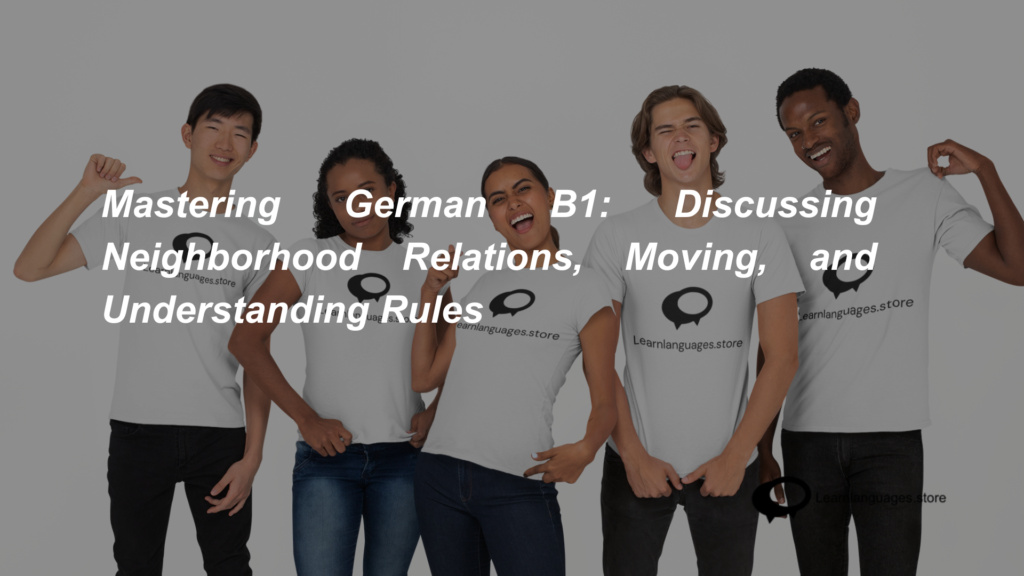Mastering German B1: Discussing Neighborhood Relations, Moving, and Understanding Rules
Mastering German B1: Discussing Neighborhood Relations, Moving, and Understanding Rules
Estimated reading time: 8 minutes
Learning German can be a rewarding experience, especially when you connect it with real-life situations such as talking about your neighborhood, understanding debates, or discussing moving to a new place. In this blog, we’ll explore these themes in detail while diving into essential German grammar concepts like Modalverben zur Wiedergabe von Regeln, Indirekte Fragen, and Partizip I und Partizip II als Adjektive. Additionally, we’ll provide a vocabulary table with examples and Hindi pronunciation guides to make your learning journey smoother. Let’s dive in and enhance your German skills!

1. Talking About Neighborhood Relations (Über nachbarschaftliche Beziehungen sprechen)
Discussing neighborhood relations is an important part of daily life in German-speaking countries. Whether you’re talking about your neighbors or your experiences in your local community, this topic is rich with vocabulary and expressions that can help you connect with others.
Example:
- German: Meine Nachbarn sind sehr freundlich und hilfsbereit.
- English: My neighbors are very friendly and helpful.
- Hindi Pronunciation: माईने नाख़बार्न ज़िंड ज़ेयर फ्रॉइंडलिष उंड हिल्फ्सबेराइट।
Vocabulary Table:
| German Word | Meaning | Example Sentence | Hindi Pronunciation |
|---|---|---|---|
| Wohnen | Living/Residence | Ich wohne in einem ruhigen Viertel. | इश वोह्ने इन आइनेम रूइगन फ़ीर्टल। |
| Nachbarschaft | Neighborhood | Die Nachbarschaft ist sehr lebendig. | दी नाख़बारशाफ़्ट इश्ट ज़ेयर लेबेंडिग। |
| Beziehungen | Relations | Nachbarschaftliche Beziehungen sind wichtig. | नाख़बारशाफ़्टलिषे बेज़ीहूंगेन ज़िंड विछटिग। |
| Lärmbelästigung | Noise Disturbance | Es gibt oft Lärmbelästigung durch Verkehr. | एश गिब्त ओफ्ट लैरम्बेलैस्टिगुंग दूर्ख फेर्केहर। |
| Umzug | Moving | Der Umzug in eine neue Stadt war stressig. | डेर उम्ज़ुग इन आइने नोये श्टाट वार श्ट्रेसिग। |
Cultural Note: In German-speaking countries, neighborhoods often have a strong sense of community. People greet each other with a friendly “Guten Tag!” and are generally considerate about things like noise and shared spaces.
2. Understanding a Debate (Eine Debatte verstehen)
Understanding and participating in debates is an excellent way to improve your German language skills, especially at the B1 level. Debates often involve the use of modal verbs and indirect questions to express opinions and ask for clarification.
Example:
- German: In der Debatte ging es darum, ob das neue Bauprojekt gut für die Stadt ist.
- English: The debate was about whether the new construction project is good for the city.
- Hindi Pronunciation: इन डेर डेबाते गिंग एश दारुम, ओब दास नोये बाउप्रोजेक्ट गूट फ्यूर दी श्टाट इश्ट।
Grammar Note: Debates often require the use of Indirekte Fragen (Indirect Questions) to politely ask for information or opinions.
Example:
- German: Können Sie mir sagen, ob der Zug pünktlich ist?
- English: Could you tell me if the train is on time?
- Hindi Pronunciation: क्योनन ज़ी मीर ज़ागन, ओब डेर त्सुग प्यूंक्तलिष इश्ट?
Grammar Explanation: Indirect questions are used to make inquiries more polite and formal. The structure involves the use of a question word (e.g., “ob,” “wie,” “wann”) followed by the subject and verb. Notice that in indirect questions, the verb is placed at the end of the sentence.
3. Discussing Moving and Residence (Über den Umzug und den Wohnort sprechen)
Talking about moving and where you live is a common topic of conversation. In German, you’ll need to know how to describe your current living situation and the process of moving.
Example:
- German: Ich ziehe nächsten Monat in eine neue Wohnung um.
- English: I’m moving to a new apartment next month.
- Hindi Pronunciation: इश त्सीहे नेक्ष्टन मोनाट इन आइने नोये वोहनुंग उम।
Cultural Note: In Germany, moving (der Umzug) is often a well-organized process, with many people hiring professional movers. It’s also common for friends and family to help out, and there are often small moving parties (“Umzugsparty”) to celebrate the new home.
-
Product on sale
 German B1
German B1₹32,600.00
₹36,300.00 -
Product on sale
 German A2
German A2₹18,300.00
₹24,300.00
4. Talking About Permission and Prohibition (Über Verbot und Erlaubnis sprechen)
Knowing how to express what is allowed and what is forbidden is crucial in everyday German. This often involves the use of modal verbs to convey rules and permissions.
Grammar Point: Modalverben zur Wiedergabe von Regeln (Modal Verbs to Express Rules)
Example:
- German: Man darf hier nicht rauchen.
- English: You are not allowed to smoke here.
- Hindi Pronunciation: मान दार्फ़ हीयर निख़्ट राउखन।
- German: Kinder dürfen hier spielen, aber nur bis 20 Uhr.
- English: Children are allowed to play here, but only until 8 PM.
- Hindi Pronunciation: किंडर दर्फ़न हीयर श्पीलेन, आबेर नूर बिस त्स्वांजिश ऊर।
Grammar Explanation:
- Modal verbs such as “dürfen” (to be allowed), “müssen” (must), “können” (can), and “sollen” (should) are used to express rules and permissions.
- The structure typically involves the modal verb in the second position and the main verb in the infinitive at the end of the sentence.
5. Summarizing Information from a Text (Informationen aus einem Text zusammenfassen)
Summarizing is an important skill, particularly when you need to convey the main points of a text in a concise manner. At the B1 level, this is often done in both spoken and written German.
Example:
- German: Der Text beschreibt die Vorteile und Nachteile des Stadtlebens.
- English: The text describes the advantages and disadvantages of city life.
- Hindi Pronunciation: डेर टेक्स्ट बेश्राइब्ट दी फॉरटाइल उंड नाख़टाइल डेस श्टाटलेबन्स।
Tip: When summarizing, focus on the key ideas and omit unnecessary details. Practice by reading short texts and summarizing them in your own words.
6. Complaining About Noise Disturbance (Sich über Lärmbelästigung beschweren)
Dealing with noise disturbance is a common issue in neighborhoods, and being able to address it politely and effectively in German is an essential skill.
Example:
- German: Ich möchte mich über den Lärm in der Nacht beschweren.
- English: I would like to complain about the noise at night.
- Hindi Pronunciation: इश म्योष्टे मिष ऊबर डेन लैरम इन डेर नाख़्ट बेश्वेरन।
Grammar Point: Partizip I und Partizip II als Adjektive (Participle I and Participle II as Adjectives)
Example:
- German: Die lärmenden Nachbarn stören meinen Schlaf. (Partizip I)
- English: The noisy neighbors are disturbing my sleep.
- Hindi Pronunciation: दी लैरमेंडन नाख़बार्न श्टोर्न माइनेन श्लाफ़।
- German: Der zerstörte Briefkasten muss repariert werden. (Partizip II)
- English: The damaged mailbox needs to be repaired.
- Hindi Pronunciation: डेर त्सेर्श्टॉरटे ब्रीफ़कास्तन मुस्स रेपारिएर्ट वेरडन।
Grammar Explanation:
- Partizip I is used for ongoing actions and is often translated as “-ing” in English (e.g., “lachend” = laughing).
- Partizip II is used for completed actions and is often the past participle in English (e.g., “zerstört” = destroyed).
- Both forms can be used as adjectives to describe nouns, providing more detailed information.
7. Cultural Note: Festivals and Customs in D-A-CH (Feste und Bräuche in D-A-CH)
Feste und Bräuche: In the D-A-CH region (Germany, Austria, Switzerland), festivals and customs play a significant role in cultural life. For example, Oktoberfest in Munich is one of the most famous festivals, celebrated with traditional Bavarian music, clothing, and, of course, beer. In Switzerland, Sechseläuten marks the beginning of spring, where a snowman figure called the Böögg is burned to predict the coming summer.
Fun Fact: In Austria, chocolate festivals such as the Schokoladenfestival showcase fashion made entirely out of chocolate. These events highlight the region’s creativity and love for both tradition and innovation.
Enhance Your German Skills!
To improve your German further, consider enrolling in our A1 Level German Course at Learn Languages Store for just Rs. 16,300. Our courses are designed to help you build a strong foundation in the German language in a fun and engaging way.
Contact Us to Learn More!
For more information about our courses, feel free to reach out to us at:
Address:
330, 3rd Floor, Big Splash (Near Vashi Bus Depot),
Sector 17, Vashi,
Navi Mumbai, Maharashtra 400703
Phone: +91-9594113111
Email: services@learnlanguages.store
Don’t miss the opportunity to enhance your language skills! Sign up today and start your journey to fluency in German!
Conclusion:
Learning German at the B1 level is a journey that becomes easier and more enjoyable when you connect the language with real-life situations, such as discussing your neighborhood, moving, or understanding rules and permissions. By practicing these themes and incorporating essential grammar points like Modalverben zur Wiedergabe von Regeln, Indirekte Fragen, and Partizip I und Partizip II als Adjektive, you’ll improve your fluency and confidence in speaking German. Remember to make use of the vocabulary and grammar tips provided here, and soon you’ll find yourself communicating more effectively in German.










